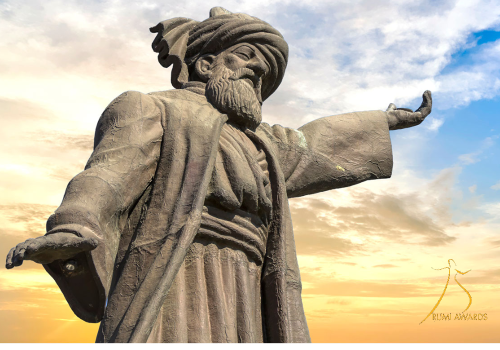Exploring the Wisdom of Rumi: A Look at His Most Inspiring Quotes
Rumi, the 13th-century poet, is widely regarded as one of the most influential and inspiring spiritual teachers of all time. His words have been translated into many languages and his works have been read and studied by millions of people around the world. His poetry is filled with wisdom and insight, and his quotes are often used to provide guidance and comfort in times of difficulty. In this article, we will explore some of Rumi’s most inspiring quotes and the lessons they can teach us.
One of Rumi’s most famous quotes is “Yesterday I was clever, so I wanted to change the world. Today I am wise, so I am changing myself.” This quote speaks to the importance of self-reflection and personal growth. It reminds us that we cannot change the world until we first change ourselves. We must be willing to look inward and examine our own thoughts, feelings, and behaviors before we can hope to make a difference in the world.
Another of Rumi’s quotes is “You were born with wings, why prefer to crawl through life?” This quote encourages us to take risks and to reach for our dreams. It reminds us that we have the power to soar above our circumstances and to create the life we want for ourselves.

Rumi also said, “The wound is the place where the Light enters you.” This quote speaks to the power of pain and suffering. It reminds us that even in our darkest moments, there is still hope and possibility. We can use our pain as a source of strength and growth, and we can use it to become more compassionate and understanding of others.
Finally, Rumi said, “Let the beauty of what you love be what you do.” This quote encourages us to pursue our passions and to live our lives with purpose and joy. It reminds us that we should strive to do what we love and to make the most of every moment.
Rumi’s words are timeless and his wisdom is still relevant today. His quotes can provide us with guidance and comfort in times of difficulty, and they can help us to find meaning and purpose in our lives. We hope that this article has inspired you to explore the wisdom of Rumi and to use his words to enrich your life.
The Power of Rumi’s Poetry: How His Words Can Transform Your Life
Rumi, the 13th-century poet, is widely regarded as one of the greatest poets of all time. His words have inspired generations of readers and continue to do so today. His poetry is filled with wisdom, insight, and beauty, and it has the power to transform our lives.
Rumi’s poetry speaks to the heart and soul of humanity. His words are filled with love, compassion, and understanding. He speaks of the power of love, the beauty of life, and the joy of being alive. He encourages us to be open to new experiences and to embrace change. He reminds us to be kind to ourselves and to others. He speaks of the importance of living in the present moment and of finding peace within ourselves.
Rumi’s poetry can help us to find clarity and direction in our lives. His words can help us to make sense of our emotions and to find meaning in our experiences. His words can help us to find strength and courage in difficult times. His words can help us to find joy and peace in our lives.
Rumi’s poetry can also help us to connect with our inner selves. His words can help us to explore our feelings and to gain insight into our lives. His words can help us to find our true purpose and to live a life of purpose and meaning.
Rumi’s poetry can help us to find hope and inspiration in our lives. His words can help us to find beauty in the world around us and to appreciate the small moments of joy that life has to offer. His words can help us to find peace and contentment in our lives.
Rumi’s poetry has the power to transform our lives. His words can help us to find clarity, direction, strength, courage, joy, peace, hope, and inspiration. His words can help us to connect with our inner selves and to find our true purpose. His words can help us to appreciate the beauty of life and to find joy in the small moments. Rumi’s poetry can help us to live a life of purpose and meaning.
The Mystical Teachings of Rumi: Uncovering the Hidden Meanings of His Poems
The Mystical Teachings of Rumi: Uncovering the Hidden Meanings of His Poems is an informative book that seeks to explore the hidden meanings of the renowned 13th century Persian poet, Rumi. Through a careful examination of his works, this book provides readers with an in-depth understanding of the spiritual and philosophical messages that Rumi sought to convey.
The book is written in a formal tone, providing readers with a comprehensive overview of Rumi’s life and works. It begins by introducing the reader to the poet’s life and works, and then delves into the various themes and symbols that are present in his poems. The book also provides an analysis of the various interpretations of Rumi’s works, and how they can be applied to our modern lives.
The Mystical Teachings of Rumi: Uncovering the Hidden Meanings of His Poems is an invaluable resource for anyone interested in learning more about the life and works of Rumi. Through its detailed analysis and thoughtful exploration of the poet’s works, this book provides readers with a comprehensive understanding of the spiritual and philosophical messages that Rumi sought to convey.
The Impact of Rumi’s Writings on Sufism and Islamic Mysticism
Rumi, the 13th century Persian poet and mystic, is widely regarded as one of the most influential figures in the history of Sufism and Islamic mysticism. His writings, which are characterized by their lyrical beauty and spiritual depth, have had a profound impact on the development of Sufism and Islamic mysticism.
Rumi’s writings are filled with references to the divine, and his works often explore the relationship between the human soul and the divine. He believed that the soul could be united with the divine through love, and his writings often focus on the idea of divine love. He also wrote extensively about the importance of spiritual growth and the need to cultivate a deep connection with the divine.
Rumi’s writings have had a major influence on the development of Sufism and Islamic mysticism. His works have inspired generations of Sufis and mystics, and his ideas have been adopted by many Islamic scholars. His writings have also been used to explain and interpret Islamic teachings, and his works have been used to help guide Muslims in their spiritual journey.
Rumi’s writings have also had a major impact on the development of Islamic art and literature. His works have been used as the basis for many Islamic paintings, sculptures, and other works of art. His writings have also been used to inspire Islamic poets and writers, and his works have been used to create some of the most beautiful and profound Islamic literature.
In conclusion, Rumi’s writings have had a profound impact on the development of Sufism and Islamic mysticism. His works have inspired generations of Sufis and mystics, and his ideas have been adopted by many Islamic scholars. His writings have also been used to explain and interpret Islamic teachings, and his works have been used to help guide Muslims in their spiritual journey. His writings have also had a major impact on the development of Islamic art and literature, and his works have been used to create some of the most beautiful and profound Islamic literature.
The Influence of Rumi on Modern Spiritual Practices: How His Teachings Live On
The 13th-century Persian poet and Sufi mystic, Jalal ad-Din Muhammad Rumi, is widely regarded as one of the most influential spiritual teachers of all time. His teachings have had a profound impact on modern spiritual practices, and his words continue to inspire and guide people around the world.
Rumi’s teachings are based on the idea that all of life is a journey of spiritual growth and transformation. He believed that the only way to truly understand the divine is to experience it directly, and he encouraged his followers to seek out their own spiritual paths. He also emphasized the importance of love, compassion, and acceptance, and he encouraged people to embrace their innermost feelings and emotions.
Rumi’s teachings have been embraced by many modern spiritual practices. His emphasis on love and acceptance has been particularly influential in the development of mindfulness meditation, which encourages practitioners to observe their thoughts and feelings without judgment. His teachings have also been embraced by many forms of yoga, which emphasize the importance of connecting with one’s inner self and the divine.
Rumi’s words have also been embraced by many spiritual teachers and authors. His writings have been translated into numerous languages and have been widely read and studied. His teachings have been used to inspire and guide people in their spiritual journeys, and his words have been used to create books, music, and art.
Rumi’s influence can also be seen in the way his teachings have been embraced by many different religious and spiritual traditions. His words have been used to create interfaith dialogues and to bridge the gap between different spiritual paths. His teachings have also been used to create a more inclusive and tolerant understanding of spirituality.
Rumi’s teachings continue to live on in the hearts and minds of people around the world. His words have been used to inspire and guide people in their spiritual journeys, and his teachings have been embraced by many different spiritual practices. His words continue to remind us of the importance of love, compassion, and acceptance, and his teachings continue to be a source of inspiration and guidance for many.


